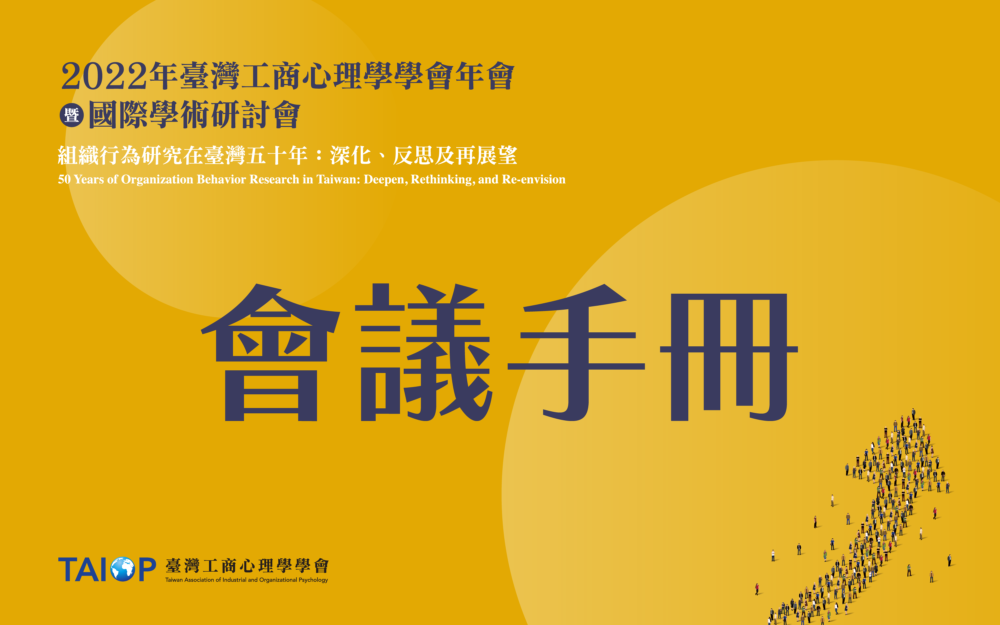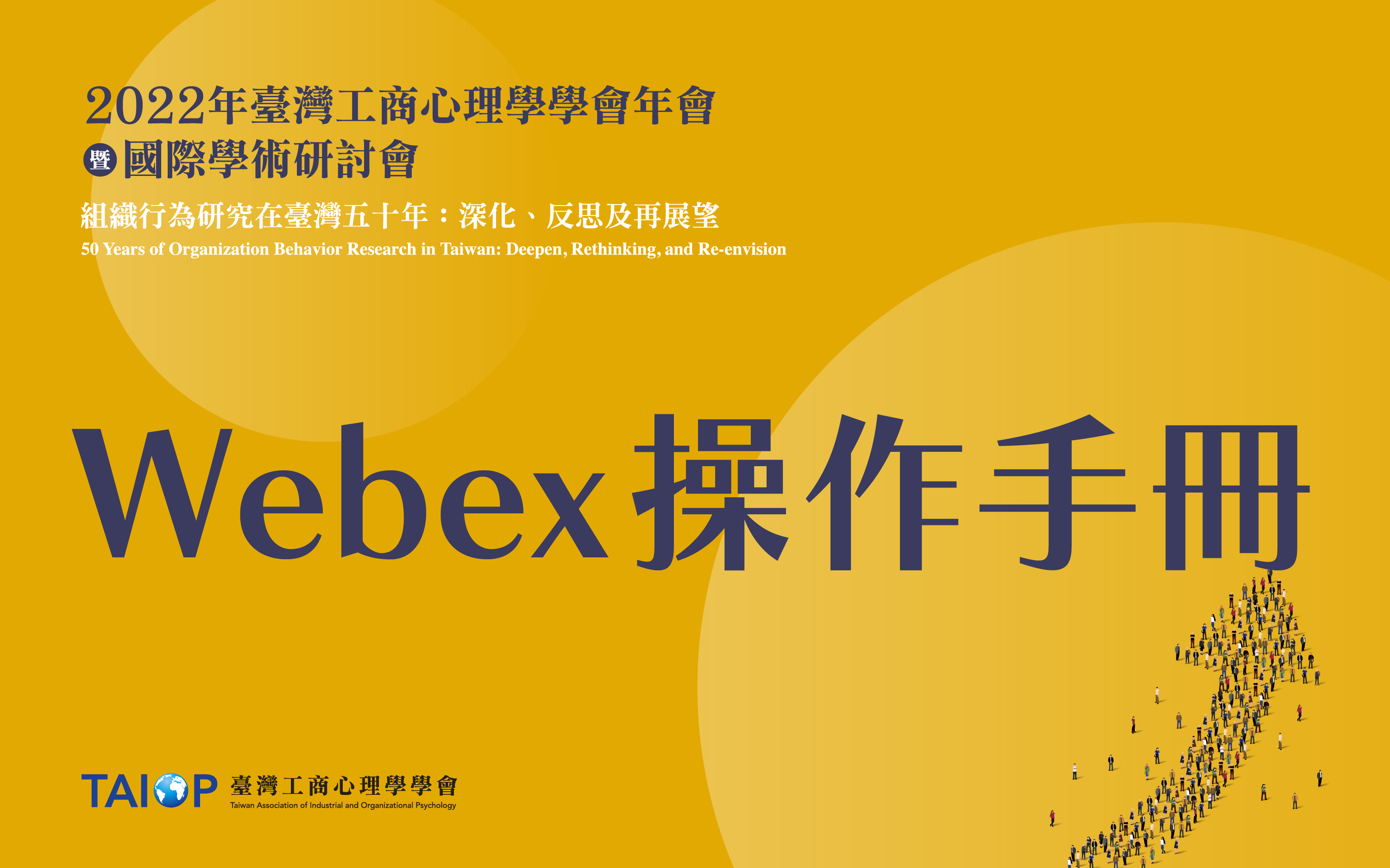主辦方視疫情狀況保留一切更動權利。
The organizer reserves all rights to make changes regarding the situation of pandemic COVID-19.
【公告 ANNOUNCEMENT】
基於防疫考量,2022年5月21日-22日舉辦之TAIOP年會暨國際學術研討會,將請報名者全數改以線上視訊會議的形式參與,使用平台為CISCO WEBEX。
TO COLLABORATE WITH GOVERNMENT FOR COVID-19 EPIDEMIC PREVENTION, THE 2022 TAIOP INTERNATIONAL CONFERENCE WILL BE HELD ONLINE ON MAY 21-22, 2022 FOR THE PARTICIPANT. THE ONLINE PLATFORM IS CISCO WEBEX.
組織行為研究在臺灣五十年:深化、反思及再展望
50 Years of Organization Behavior Research in Taiwan: Deepen, Rethinking, and Re-envision
會議時間 Dates
2022年5月21日(六)、22日(日)
May 21 (Sat.) – 22 (Sun.) 2022
會議地點 Venue
國立臺灣大學思亮館
合併線上直播
National Taiwan University Shih-Liang Hall
and Live Stream
主辦單位 Organizer
社團法人臺灣工商心理學學會
臺大心理學系、政大心理系
TAIOP
Department of Psychology, NTU
Department of Psychology, NCCU
自從1992年起,臺灣組織行為學者每十年定期舉辦國際學術研討會,回顧與檢討組織行為研究的議題與取向。在議題上,學者探討臺灣重要組織行為議題深化的程度,例如組織領導或組織認同,反思目前已經解決哪些研究問題?還有哪些問題尚未解決?如何克服現有的侷限與缺失以展望未來。再者,隨著科技的進展與工作典範的轉移,有哪些研究議題是組織行為研究者可以開創或再投入的,例如職場心理健康議題的開發,可以為臺灣建構新的職場生態系統,讓企業組織朝向幸福圓滿的新境界前進。因此,對於本地組織行為研究議題的定期檢視與回顧,不但可以用來開發新的組織行為研究議題與模式,甚可用來發展解決企業問題的有效方案,如此讓企業精益求精進而脫胎換骨。
在研究路線上,組織行為學者致力檢視以往研究的自主性與開創性,期望能從「理論華人化」的作法走向「華人化理論」的新境界,讓本土的研究成果站上國際學術舞台,擴大對全球的學術影響力。因此,就未來的學術發展過程而言,何種研究策略是需要的?客位研究取向是否為主位研究取向的必經過程?是否可融合客位與主位兩種研究取向來進行新理論的開展?在修正取向的跨文化研究取徑、探勘與開發取向兼重的本土研究取徑、以及融合取向的全球化研究取徑(鄭伯壎、黃敏萍,2019)中,研究者應當如何選擇及取捨?透過學者對於研究的深化、反思及展望循環,可以使臺灣組織行為的研究朝向全面性的發展,進而讓臺灣本土組織行為的研究議題,一躍成為國際學術研究社群的新焦點。
本次會議主題為「組織行為研究在臺灣五十年:深化、反思及再展望」,我們將針對過往組織行為的研究議題與研究取向進行深入的討論,用以激發新的研究思維與觀點,進而為本地企業組織發展可能的組織行為解決方案與對策。經由本次研討會的召開與提供的交流平台,期冀能對臺灣組織行為研究與實務提供新見解,誠摯歡迎關注此議題的學者與實務工作者踴躍賜稿,如此促進社群間的對話,用來建立學術研究與實務工作間的生態體系。
Since 1992, Taiwanese organizational behavior scholars have regularly held international academic seminars every ten years to review the topics and orientations of organizational behavior research. On the topic, scholars discuss the degree of deepening the importance of organizational behavior issues in Taiwan, such as organizational leadership or organizational identification, and reflect on what research issues have been solved so far? What problems are still unresolved? How to overcome existing limitations and deficiencies to look to the future? Further, with the advancement of technology and the shift of work paradigms, what research issues can organizational behavior researchers create or reinvest? For example, the development of workplace mental health issues can build a new workplace ecosystem for Taiwan, allowing business organizations to move towards a new realm of happiness and fulfillment. Therefore, regular inspection and review of local organizational behavior research topics can be used to develop not only new organizational behavior research topics and patterns but also effective solutions to corporate problems, so that companies can improve and reinvent themselves.
On the research route, organizational behavior scholars are committed to examining the autonomy and innovation of previous research, hoping to move from the “theoretical Chineseization” approach to a new realm of “Chineseization theory”, so that local research results can stand on the international academic stage and expand the influence to global academia. Therefore, what research strategies are needed for the future academic development process? Is the etic research orientation a necessary process for the emic research orientation? Is it possible to integrate the two above research orientations to carry out the development of new theories? In the cross-cultural research approach with a revised orientation, a local research approach with both exploration and development orientations, and a global research approach with a fusion orientation (Cheng Bor-Shiuan & Huang Min-Ping, 2019), which way should researchers choose? Through the deepening, reflection, and prospect cycle of scholars’ research, the research on Taiwan’s organizational behavior can be developed towards comprehensive development, and the research topic of Taiwan’s local organizational behavior can become a new focus of the international academic research community.
The theme of this conference is “Fifty Years of Organizational Behavior Research in Taiwan: Deepening, Rethinking, and Re-prospecting”. We will conduct in-depth discussions on the research topics and research orientations of organizational behavior in the past to stimulate new research thinking and perspectives. This in turn develops possible organizational behavior solutions and countermeasures for local business organizations. Through the convening of this conference and the communication platform, we hope to provide new insights into the research and practice of organizational behavior in Taiwan. We sincerely welcome scholars and practitioners who pay attention to this topic to contribute their theses, so as to promote dialogue between communities and to establish an ecosystem between academic research and practical work.
【公告 ANNOUNCEMENT】
2022 TAIOP年會暨國際學術研討會,將同時透過Cisco Webex以線上直播會議的方式進行。
2022 TAIOP International Conference will be held online via Cisco Webex at the same time.
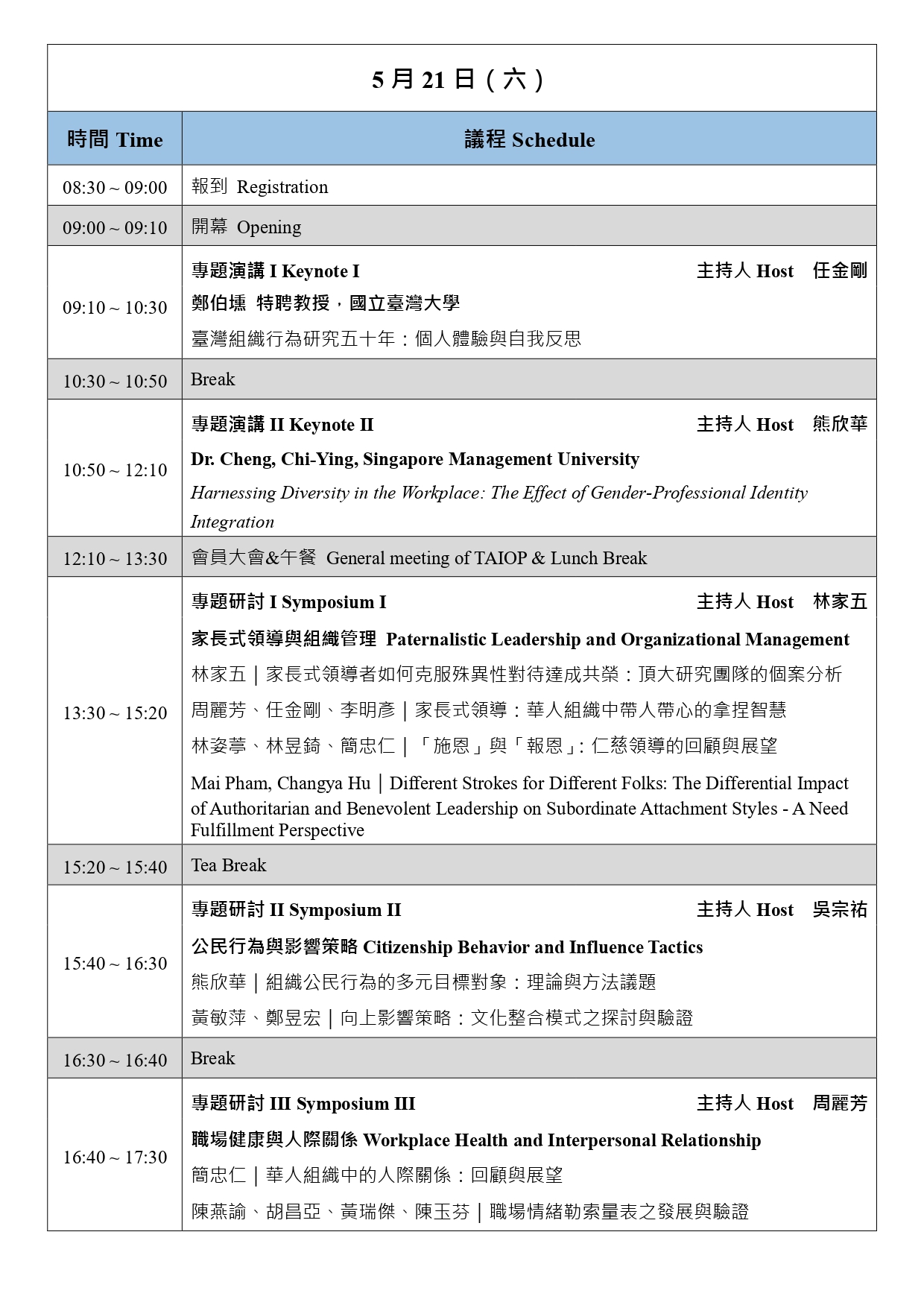
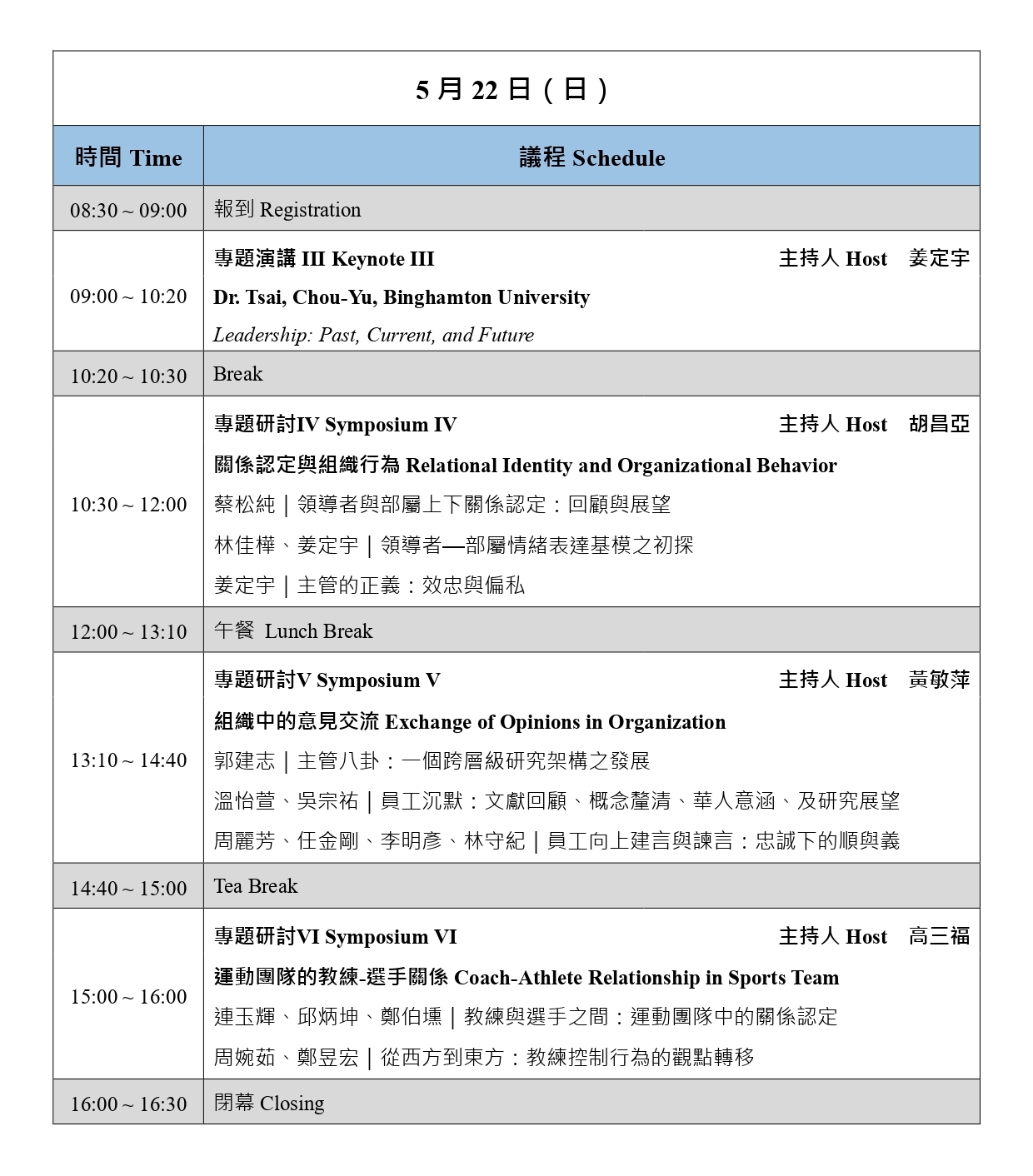
論文摘要集 Abstract collection
【公告 ANNOUNCEMENT】
因全球COVID-19疫情嚴峻,本會以保護講者、與會者健康為第一優先考量,原定來台兩位專題演講講者(keynote speaker)─Dr. Chou-Yu Tsai 與Dr. Chi-Ying Cheng,將改以視訊形式參與本會。若造成不便,敬請包涵見諒。
Concerning the COVID-19 pandemic has been reported dangerous globally, the two distinguished keynote speakers, Dr. Chou-Yu Tsai and Dr. Chi-Ying Cheng, will be joining us and giving their speech online. Thank you for your understanding and please follow for more information.

鄭伯壎 特聘教授(國立臺灣大學,臺灣)
Dr. Bor-Shiuan, Cheng (National Taiwan University, Taiwan)
心理學系終身特聘教授、傅斯年紀念講座教授、第25屆國家講座主持人(社會科學類)
”講題Topic
臺灣組織行為研究五十年:個人體驗與自我反思
50 Years of Organizational Behavior Research in Taiwan: Personal Experience and Self-Reflection

Dr. Chi-Ying Cheng (Singapore Management University, Singapore)
Associate Professor of Psychology, School of Social Sciences, IRB Chair
”Topic
Harnessing Diversity in the Workplace: The Effect of Gender-Professional Identity Integration

Dr. Chou-Yu Tsai (Binghamton University, USA)
Assistant Professor of Management, School of Management, Bernard M. & Ruth R. Bass Center for Leadership Studies
”Topic
Leadership Studies: Past, Current, and Future
-
家長式領導與組織管理│ Paternalistic Leadership and Organizational Management
-
關係認定與組織行為│ Relational Identity and Organizational Behavior
-
公民行為與影響策略│Citizenship Behavior and Influence Tactics
-
組織中的意見交流│Exchange of Opinions in Organization
-
職場健康與人際關係│Workplace Health and Interpersonal Relationship
-
運動團隊的教練-選手關係│Coach-Athlete Relationship in Sports Team
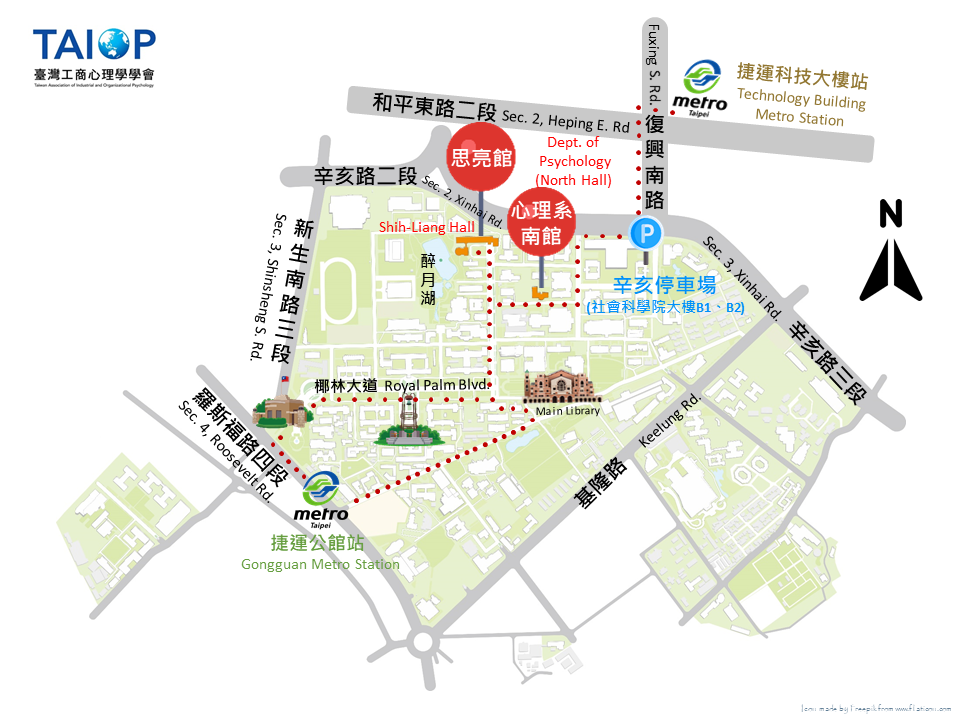
開車
- 國道1號由建國南路交流道下,走高架往南至辛亥路出口下,靠右行駛慢車道往木柵方向,至復興南路口右轉進入臺大辛亥路大門。
- 國道3號由20.8公里木柵交流道下往台北方向,接國3甲線至辛亥路,穿過基隆路車行地下道後靠右慢車道行駛至復興南路口,左邊即臺大辛亥路大門。
停車資訊
-
校園停車格 30元/30分鐘
-
辛亥地下停車場(入口:進辛亥路校門柵欄前右側,出口:辛亥路2段)
汽車:20元/30分鐘;
機車:20元/次
如何上高速公路
-
國道1號:由臺大辛亥路大門,左轉辛亥路上建國高架道。
-
國道3號:出臺大辛亥路大門,右轉辛亥路接國3甲聯絡道。
捷運
- 捷運新店線:公館站2號出口,沿舟山路過圖書館左轉,步行約13分鐘。
- 捷運文湖線:科技大樓站,沿復興南路往南走約600公尺由辛亥路校門進入後第一個路口右轉。
公車
- 臺大資訊大樓站
298、懷恩S31(於捷運公館站3號出口搭乘) - 羅斯福路公館站
30、653、74、254、278、643、644、252、251、236、 606、
291、208、1、510、253、907。 - 新生南路臺大站
642、290、505、907、284、253、52、280、311、○南,由西側門進入台大。 - 和平東路復興南路口站
3、72、74、18、52、211、235、284、237、278、15、209、295、626、和平幹線、敦化幹線。
